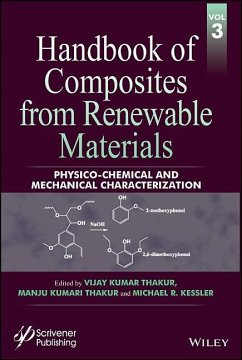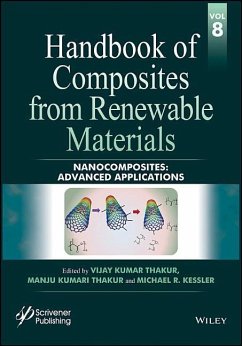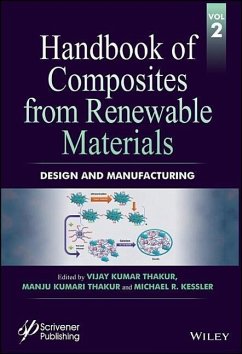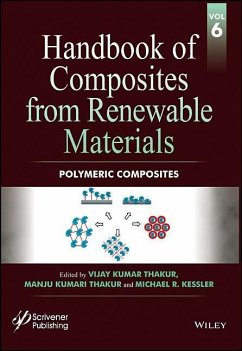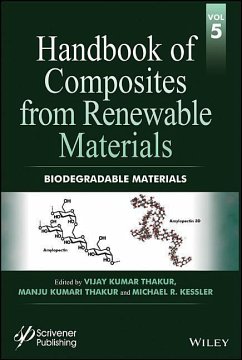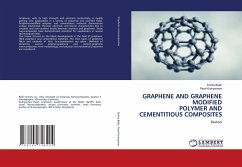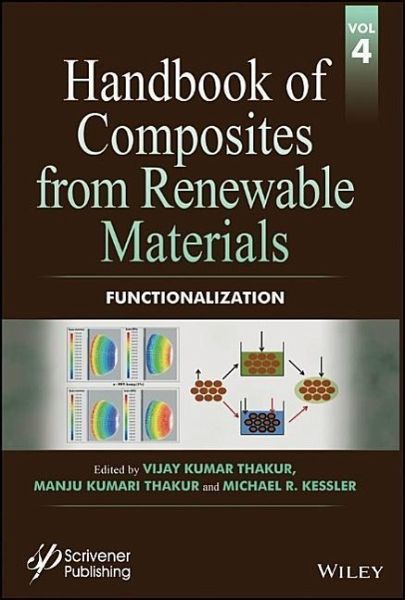
Handbook of Composites from Renewable Materials, Functionalization
Versandkostenfrei!
Versandfertig in über 4 Wochen
274,99 €
inkl. MwSt.
Weitere Ausgaben:

PAYBACK Punkte
137 °P sammeln!
This unique multidisciplinary 8-volume set focuses on the emerging issues concerning synthesis, characterization, design, manufacturing and various other aspects of composite materials from renewable materials and provides a shared platform for both researcher and industry. The Handbook of Composites from Renewable Materials comprises a set of 8 individual volumes that brings an interdisciplinary perspective to accomplish a more detailed understanding of the interplay between the synthesis, structure, characterization, processing, applications and performance of these advanced materials. The H...
This unique multidisciplinary 8-volume set focuses on the emerging issues concerning synthesis, characterization, design, manufacturing and various other aspects of composite materials from renewable materials and provides a shared platform for both researcher and industry. The Handbook of Composites from Renewable Materials comprises a set of 8 individual volumes that brings an interdisciplinary perspective to accomplish a more detailed understanding of the interplay between the synthesis, structure, characterization, processing, applications and performance of these advanced materials. The Handbook comprises 169 chapters from world renowned experts covering a multitude of natural polymers/ reinforcement/ fillers and biodegradable materials. Volume 4 is solely focused on the Functionalization of renewable materials. Some of the important topics include but not limited to: Chitosan-based bio sorbents; oil spill clean-up by textiles; pyridine and bipyridine end-functionalized polylactide; functional separation membranes from chitin and chitosan derivatives; acrylated epoxidized flaxseed oil bio-resin and its biocomposites; encapsulation of inorganic renewable nanofiller; chitosan coating on textile fibers for functional properties; surface functionalization of cellulose whiskers for nonpolar composites; impact of chemical treatment and the manufacturing process on mechanical, thermal and rheological properties of natural fibers based composites; bio-polymers modification; review on fibers from natural resources; strategies to improve the functionality of starch based films; the effect of gamma-radiation on biodegradability of natural fibers; surface functionalization through vapor-phase assisted surface polymerization (VASP) on natural materials from agricultural by-products; okra bast fiber as potential reinforcement element of biocomposites; silane coupling agent used in natural fiber/plastic composites; composites of olefin polymer /natural fibers: the surface modifications on natural fibers; surface functionalization of biomaterials; thermal and mechanical behaviors of bio-renewable fibres based polymer composites; natural and artificial diversification of starch; role of radiation and surface modification on bio-fiber for reinforced polymer composites. Audience This valuable reference work will be read and consulted by researchers, engineers and students both in academia and industry who are working in the field of materials science especially polymer composites/technology. Composites from renewable materials have significant industrial applications especially in the automotive, marine, aerospace, construction, wind energy and consumer goods industries.




